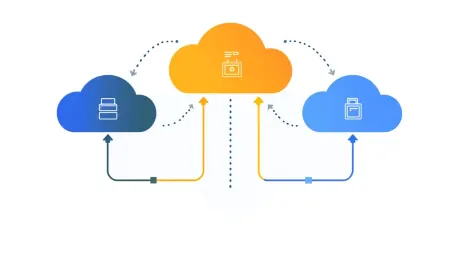In today’s rapidly evolving IT landscape, multi-cloud strategies have become a cornerstone for businesses aiming to optimize their operations. With 89% of companies leveraging multi-cloud approaches, the integration of public and private clouds offers unparalleled flexibility and efficiency. However, to truly harness the potential of multi-cloud environments, DevOps teams must be equipped with the right skills and strategies.
Understanding Multi-Cloud and DevOps
The Rise of Multi-Cloud Strategies
Multi-cloud technology allows organizations to utilize the best features of both public and private clouds. Public clouds provide scalable, on-demand resources, while private clouds offer enhanced control and security. This hybrid approach maximizes efficiency and utility, making it a popular choice for modern IT infrastructures. The ability to leverage multiple cloud environments ensures that businesses can avoid vendor lock-in and select the most suitable cloud services for their specific needs.
This shift towards multi-cloud strategies is driven by the need for robust infrastructure capable of handling diverse and complex workloads. By spreading their workloads across different cloud providers, organizations can achieve greater resilience and redundancy. This results in improved disaster recovery capabilities and uninterrupted service delivery. However, the complexity of managing multiple cloud environments cannot be underestimated, necessitating advanced skills and tools to ensure seamless integration and operation.
The Role of DevOps in Multi-Cloud Environments
DevOps, which combines development and operational tasks, is essential for the seamless deployment and management of applications. By fostering faster deployments and reducing issues, DevOps teams can significantly enhance the performance of multi-cloud systems. However, this requires a shift from traditional IT setups to a more integrated and collaborative approach. The core principles of DevOps—automation, continuous integration, and continuous delivery—are crucial to managing the dynamic and often fragmented nature of multi-cloud environments.
In a multi-cloud context, DevOps teams must adapt to handle diverse cloud services and configurations. This involves creating a unified pipeline for application deployment that can seamlessly operate across different cloud platforms. Additionally, adopting infrastructure as code (IaC) practices allows teams to automate the provisioning and management of cloud resources, ensuring consistency and reducing manual errors. By leveraging these methodologies, DevOps teams can maintain high deployment frequency and ensure reliable service performance across multiple cloud environments.
Building a Proficient DevOps Team
Identifying Technological Talent
Transitioning to a DevOps framework necessitates a team skilled in handling simultaneous tasks and innovative problem-solving. Identifying or nurturing such talent within the organization is crucial. This involves not only technical skills but also the ability to adapt to the dynamic nature of multi-cloud environments. A proficient DevOps engineer should possess expertise in various cloud platforms, programming languages, and automation tools. They must also be capable of working with containerization and orchestration technologies like Docker and Kubernetes.
To build a robust DevOps team, organizations can invest in training programs and certifications that focus on multi-cloud management. This ensures that the team stays abreast of the latest advancements in cloud technologies and DevOps practices. Furthermore, fostering a culture of continuous learning and improvement is essential. Encouraging team members to attend industry conferences, participate in workshops, and engage with the broader DevOps community can enhance their skills and bring fresh perspectives to the organization.
Setting Clear Expectations
For DevOps to thrive, clear milestones, deliverable dates, and goals are essential. This helps maintain focus and direction, ensuring that projects stay on track. By setting clear expectations, teams can work more efficiently and avoid the pitfalls of miscommunication and project delays. Establishing a well-defined roadmap with incremental goals allows for better tracking of progress and timely identification of potential issues. This structured approach also helps in aligning the team’s efforts with the organization’s broader objectives.
Effective communication plays a pivotal role in setting and achieving clear expectations. Regular meetings, collaborative planning sessions, and transparent reporting mechanisms enable teams to stay synchronized and address any challenges proactively. Moreover, incorporating feedback loops into the development process allows for continuous refinement of goals and deliverables based on real-world outcomes. By fostering a culture of accountability and open communication, organizations can ensure that their DevOps teams remain focused, motivated, and aligned with their strategic vision.
Fostering a Collaborative Culture
DevOps functions best in an open, collaboration-first environment. Eliminating silos and promoting free communication over rigid correctness boosts the iterative and experimental nature of DevOps. Leadership should adopt a hands-off approach, allowing teams the autonomy to innovate and improve without constant oversight. Encouraging cross-functional collaboration among development, operations, and quality assurance teams creates a cohesive environment where shared objectives can be pursued collectively. This collaborative ethos also facilitates faster problem-solving and more effective troubleshooting.
Implementing tools and practices that support collaboration is crucial to fostering a DevOps culture. Using integrated development environments (IDEs), version control systems, and communication platforms like Slack helps streamline interactions and coordination among team members. Additionally, embracing agile methodologies such as Scrum or Kanban enables teams to adapt to changing requirements and deliver incremental value consistently. By promoting a culture of transparency, trust, and mutual respect, organizations can empower their DevOps teams to achieve higher efficiency and innovation.
Essential Skills for Multi-Cloud Management
Cloud Platform Specializations
Each cloud platform, such as Google Cloud, Microsoft Azure, and Amazon Web Services (AWS), offers unique features and strengths. Google Cloud excels in data processing and AI, AWS boasts extensive service offerings, and Azure shines in PaaS and seamless integration with Microsoft products. Developing specialized skills in these platforms is crucial for utilizing their full potential. DevOps teams must be well-versed in the specific services, tools, and best practices associated with each cloud platform to ensure optimal performance and scalability.
In-depth knowledge of cloud platform services helps DevOps teams design and implement robust, scalable, and cost-effective solutions. For instance, understanding AWS Lambda’s serverless computing capabilities or Azure’s AI and machine learning services enables teams to leverage these features to enhance their applications. Additionally, proficiency in cloud-native concepts such as microservices, containerization, and service meshes is essential for creating resilient and scalable architectures. By mastering the intricacies of each cloud platform, DevOps teams can optimize their multi-cloud strategies and drive innovation.
Containerization Proficiency
For seamless application performance across diverse platforms, proficiency with containerization tools like Kubernetes, Docker, OpenShift, and Amazon Elastic Compute Cloud is essential. Containers ensure that applications remain portable and consistent, simplifying deployment and testing across multiple cloud environments. DevOps teams must be adept at container orchestration to manage complex, distributed applications efficiently. Kubernetes, in particular, has become the de facto standard for container orchestration, providing powerful features for automating deployment, scaling, and management of containerized applications.
Containerization enables DevOps teams to decouple applications from the underlying infrastructure, allowing for greater flexibility and resilience. This approach also streamlines continuous integration and continuous delivery (CI/CD) pipelines by providing a consistent environment for building, testing, and deploying applications. To maximize the benefits of containerization, teams should adopt best practices such as immutable infrastructure, declarative configuration, and automated rollbacks. By mastering containerization technologies and methodologies, DevOps teams can ensure reliable and efficient application performance in multi-cloud environments.
Monitoring Mastery
A notable challenge with multi-cloud setups is decreased observability, leading to potential security and performance concerns. Training in real-time monitoring tools is vital to maintain comprehensive oversight. Solutions that offer real-time data analysis, detailed dashboards, and customizable alerts enable teams to detect and address issues promptly before they escalate. DevOps teams should be proficient in using monitoring and observability tools such as Prometheus, Grafana, New Relic, and Datadog to gain insights into their multi-cloud environments.
Effective monitoring involves collecting and analyzing metrics, logs, and traces from various sources to ensure optimal performance and security. This comprehensive visibility allows DevOps teams to identify bottlenecks, troubleshoot issues, and optimize resource utilization. Implementing automated monitoring and alerting systems can also help detect anomalies and trigger proactive responses to potential threats. By prioritizing monitoring and observability, DevOps teams can maintain high availability, security, and performance across their multi-cloud environments.
Strategies for Effective Multi-Cloud DevOps
Leveraging Automation
Automation is a key component of successful DevOps in multi-cloud environments. By automating repetitive tasks, teams can focus on more strategic initiatives. This includes automated testing, deployment, and monitoring, which can significantly reduce the time and effort required to manage multi-cloud systems. Automation tools such as Jenkins, Ansible, Terraform, and AWS CloudFormation can streamline workflows and ensure consistency across different cloud platforms. DevOps teams should prioritize creating automated pipelines that integrate seamlessly with their multi-cloud environments.
Implementing automation reduces manual intervention, minimizes errors, and accelerates the delivery of software updates and bug fixes. Automated testing ensures that applications meet quality standards and function correctly across different cloud environments. Additionally, automated deployment processes enable rapid and reliable rollouts of new features and updates. By embracing automation, DevOps teams can enhance efficiency, improve reliability, and reduce the operational burden associated with managing complex multi-cloud systems.
Ensuring Security and Compliance
Security and compliance are paramount in multi-cloud environments. DevOps teams must be well-versed in the security protocols and compliance requirements of each cloud platform. This involves continuous monitoring and updating of security measures to protect sensitive data and ensure regulatory compliance. Implementing best practices such as encryption, identity and access management (IAM), and intrusion detection systems (IDS) is essential for safeguarding multi-cloud environments. DevOps teams should also stay informed about industry standards and regulations, such as GDPR, HIPAA, and SOC 2, to ensure compliance.
A proactive approach to security and compliance includes conducting regular security assessments, vulnerability scans, and penetration tests. DevOps teams should adopt a “shift-left” mindset, incorporating security considerations early in the development process. Integrating security tools into CI/CD pipelines enables continuous security validation and reduces the risk of vulnerabilities being introduced into production. By prioritizing security and compliance, DevOps teams can protect their multi-cloud environments and maintain customer trust.
Continuous Learning and Adaptation
The IT landscape is constantly evolving, and so must DevOps teams. Continuous learning and adaptation are essential for staying ahead of the curve. This includes regular training sessions, attending industry conferences, and staying updated with the latest trends and technologies in multi-cloud and DevOps. Encouraging a culture of continuous improvement ensures that team members remain proficient in emerging tools and practices. Organizations can support this by providing access to online courses, certifications, and knowledge-sharing platforms.
Staying informed about the latest developments in cloud computing, automation, and DevOps methodologies enables teams to adopt best practices and innovate effectively. Participating in industry forums and communities fosters collaboration and knowledge exchange with peers facing similar challenges. By prioritizing continuous learning and adaptation, DevOps teams can enhance their skills, drive innovation, and maintain a competitive edge in the rapidly evolving IT landscape.
Conclusion: Maximizing Multi-Cloud and DevOps Synergy
In today’s fast-paced IT landscape, multi-cloud strategies have become fundamental for businesses aiming to enhance and streamline their operations. Currently, a significant 89% of companies are utilizing multi-cloud approaches, combining public and private clouds to achieve unmatched flexibility and efficiency. This blend allows businesses to leverage the strengths of different cloud environments, addressing specific needs more effectively. However, to truly capitalize on the benefits offered by multi-cloud environments, DevOps teams must possess the appropriate skills and devise effective strategies.
With the increasing complexity of IT demands, companies can no longer rely on a single cloud solution. The hybrid use of multiple cloud services helps to avoid vendor lock-in, ensures higher availability, and optimizes cost management. DevOps teams play a pivotal role in this scenario, necessitating proficiency in various cloud platforms to seamlessly integrate and manage diverse systems. To stay competitive, businesses must invest in training their DevOps teams, equipping them with up-to-date knowledge and tools to navigate and maximize multi-cloud ecosystems successfully.









